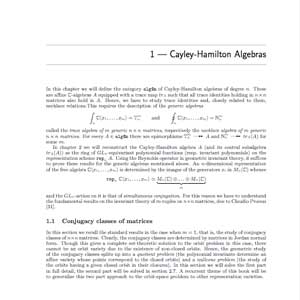
We are nearly done, I hope. One can keep on tweaking
parameters endlessly, so at regular intervals we grab our chief graphics designer and tell him :
decision time! which of the two is best? At the moment, we decided on
our own chapter-style \chapterstyle{neb} which is an
adaptation of the _demo-style_ in
memoir.cls (see on the left). We also have our own page-style which
is an adaptation of the _companion-style_ (the house-style of the
LaTeX Companion series).
You
will notice that the page-format is a bit odd. As mentioned before, we
didn’t want to copy the _regular_ mathematics-book -look.
We went for a fun format (square, 7.5 by 7.5 inch ; think of an inflated
CD-box) as well as a handy one (so we will go for _spiral-bound_
books). The reason for this is that we noticed that the most consulted
copy of version 2 around at the department is
Stijn’s which has a nice coil binding so you can always lay it
nicely flat on a desk, whether you just want to look something up, or
use it to explain something at the blackboard.
Perhaps you can
even see that the font is slightly smaller than the _regular
10pt_. Memoir allows for a _9pt font_ and this looks _so
much_ better. Besides, it helps to keep the number of pages
reasonable, and related to this : keep the production costs low. At the
moment the plan is to be able to sell a book of say 260 pages under 13
Euros (that is, 5 EuroCent/page), but more on this next week.
What else? Well, recently, we decided on the
_copyright_-license (at least for the first book). Clearly, all
neverending-books will have their own ISBN-number
and the copyright is one of the
Creative Common
Licenses. At first we thought of taking the same one that protects
(however, see mewt’s story
) this site and which is, in technical terms, a by-nc-nd:be
license. But, in the end, we decided to go for a Developing Nations
License. Here\’s why :
The Developing
Nations license allows, for the first time, any copyright holder in the
world to participate first-hand in reforming global information policy.
The fact is that most of the world’s population is simply priced
out of developed nations’ publishing output. To authors, that
means an untapped readership. To economists, it means “deadweight
loss.” To human rights advocates and educators, it is a tragedy.
The Developing Nations license is designed to address all three
concerns.
So, what else needs to be done by next
week when we hope to launch our first book? Well, I need to write some
_blurb_ and we have to decide on front- and back-covers.
Tomorrow, I hope to report on how that one ended.
Comments